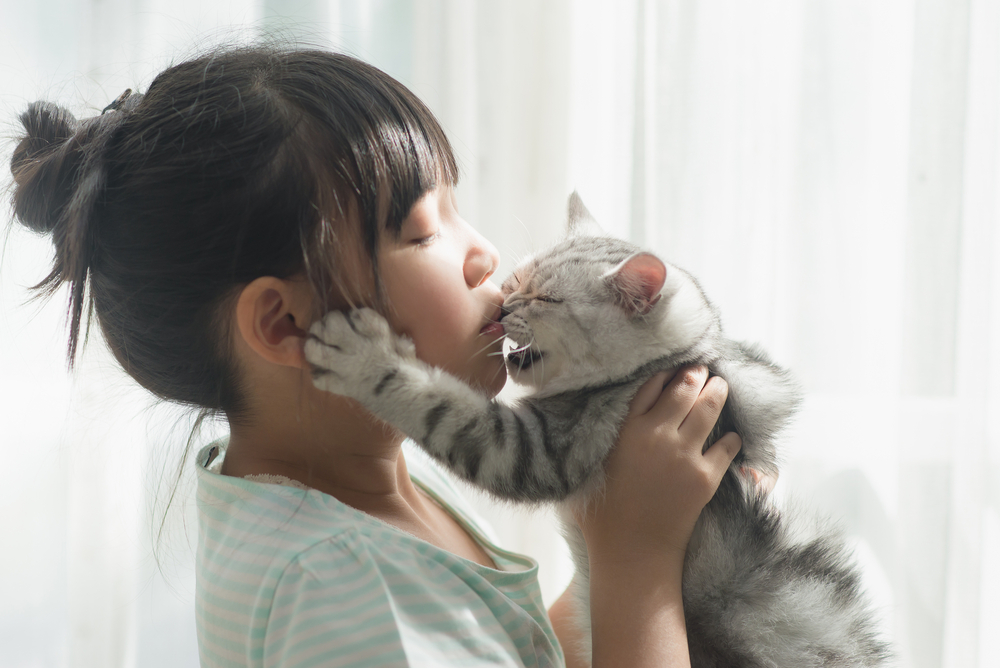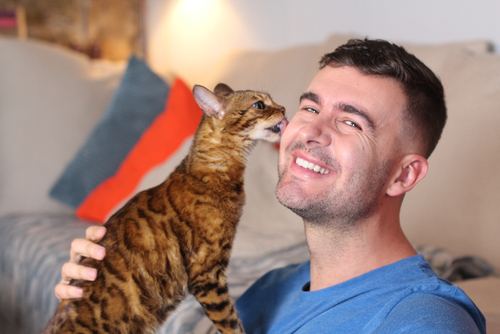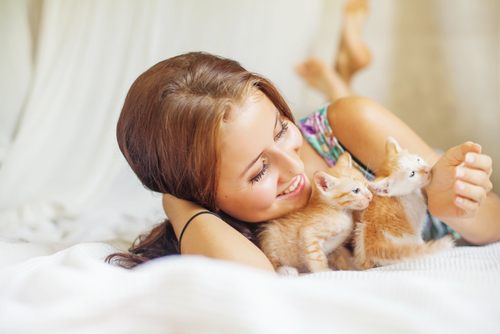Snuggling up with a cat is a wonderful experience – the deep, soothing purr, the sweet “kneading” movement he’ll do with his paws when he’s comfortable, and the relaxing warmth of his fur. Then, it happens: yowch! He starts grooming an available hand, arm, or an exposed pet parent’s leg with his rough-as-sandpaper tongue.
It may be a one-off lick or he may focus on the area as if he were straightening his own fur – but he must know humans don’t need the hairdressing help, right? If you’re wondering “Why do cats lick you?”, you are not alone. In this article, we are going to explain this strange behavior further and discuss warning signs of when this action should warrant a trip to the vet.
What Does A Cat Licking You Mean?
Understanding why cats lick you starts with digging into the reasons felines lick at anything but food to begin with, and there’s a surprising number of reasons that may be in play.
- He’s simply pack-bonding: While cats are very adept (and flexible) when it comes to the grooming and upkeep of their own fur, like a stubborn itch on the back, some spots need a helping hand. For cats, these areas are typically the back of the head or just between the shoulder blades. Coincidentally, the latter’s placement is precisely why vets direct cat owners to apply topical medicines in that area: cats aren’t able to lick treatments like liquid flea medicine off because they can’t quite twist that way.
So why does a lick-happy cat go for the hand or arm, in that case? Think about the positions that groups of cats lay in when they’re in the wild. Lions laze next to one another, all at roughly the same height – this makes it easy to lean over and lick those hard-to-reach neck and shoulder areas on a feline neighbor. The human body is built very differently, of course, so a domesticated pet cat will reach out and lick whatever’s closest to them – in this case, their owner’s hand, leg, or forearm.
- His “lick spot” may be stimulated: While feline researchers are still exploring the science behind the lick spot in cats, it’s commonly believed that it’s an ingrained behavior from his nursing kittenhood. Just as the act of “feline kneading” with front paws is an echo of his pawing at a mother cat’s stomach to stimulate milk production while nursing, the lick spot is a mother cat’s own habitual mark.
As a kitten nurses, a mother cat will lean down to groom them thoroughly, as her energetic kitten is a rare captive audience while he’s eating. In some cats, the sensitivity of this spot, often found on the lower spine just before the tail, causes them to involuntarily look around in a “searching” motion while frantically licking anything in reach. The effect is similar to petting a specific spot on some dogs’ ribs or stomachs to make their leg shake rhythmically.
- He might be on a salt kick: Even trace amounts of sweat brings salts to the surface of the skin, often at subtle concentrations that would go unnoticed by other humans. A cat, however, has a finely-honed sense of smell and taste, and may simply be after his pet parent like a can-opening, ear-scritching salt lick.
While they aren’t on the air-tasting level of snakes, cats do rely on their sense of smell and taste for important information about their environment. If he is tasting his human companion’s skin, he may like – or even need – the natural salts present.
- It may be a signal to other cats: As far as marking things that belong to them go, cats’ licking is on the low end of the concern scale for most pet parents. While tom cats will often mark their territory with bursts of urine (also called feline spraying), a quick lick is also a signal to nearby cats that a pet parent is “owned” by the licking cat!
The cat he’s trying to ward off may be pre-emptive (e.g., any other cats encountered on a commute, at the workplace, or anywhere in the world outside the house), or it may be a member of his own household, human or otherwise.
- He may be stressed out and attempting to self-soothe: Humans bite their nails and suck their thumbs in times of high stress, and may continue to do so well into old age. Licking may be a cat’s natural instinct to help calm themselves, particularly in the face of big changes – a move, an addition to the household, for example. Any kind of feline anxiety can instigate this kind of strange behavior in a cat.
This behavior may even be triggered by a recent absence of a household member. It may be someone moving out entirely, or even a regular person that’s gone away on a trip. Cats prefer routine and when that routine is upset, he can start exhibiting some strange behaviors, like licking, to cope.
When Is A Licking Cat A Concern?
Cats naturally lick themselves and members of their family – furry or not – every day. This is because their tongues are covered in backwards-facing barbs that, in addition to helping them eat prey in the wild, also act as a comb. These barbs catch and remove loose fur and debris to keep a cat’s coat clean and shiny – a must for their overall health. That doesn’t mean that licking can’t indicate a serious health concern, however: here’s what to watch for:
- Licking accompanied by drooling, foaming, or his tongue lolling out of his mouth: These are physical indicators of a health issue and each should be immediately addressed by an emergency vet.
- Licking frantically, despite a pet parent’s firm removal of their hand or arm: While a cat should be eager to groom you as one of his family members, if he just won’t stop there may be behavioral issues at play.
- Licking habitually at a place on their body: This is indicative of overgrooming in cats, a behavior very similar to a human biting their nails or twisting on a lock of their hair. The behavior may also be caused by an allergy to something in his environment, such as seasonal grass, or a new pet medication.
In general, a cat licking his owner’s hand or arm a few times won’t do any harm to either human or feline. However, the human in question shouldn’t use heavy hand creams, perfumes, or other topical products that may be ingested by their cat by accident.
How Do I Stop My Cat From Licking Me?
The rasp of a rough kitty tongue on a bare arm can feel very uncomfortable, but how can one stop the behavior? To begin with, if the cat in question isn’t spayed or neutered already, make sure to do so: hormonal changes can have a lot to do with the way they act.
Make sure he has access to fresh water and food at all times, and get his vitals checked by a veterinarian. If he is displaying excessive licking, be sure to discuss during the visit, including any other unusual behaviors observed. He may be deficient in a vitamin and seeking to replace it by “grooming” his human’s skin regularly.
Note: If he still persists, a personal spray water bottle set to a gentle “mist” setting and aimed at his side may do the trick. It won’t hurt him, but the noise and effect will make him think twice about doing it again.
Keeping Your Cat Safe: When Feline Licking Can Pose A Health Hazard
If a cat is prone to licking out of boredom, when stressed, or just habitually, it’s important to make sure that an arm is the worst thing he can get a hold of. Common décor items, such as salt lamps, can be extremely problematic for cats; they are often drawn to lick them to excess and develop potentially-deadly salt overdoses. The same rule applies to scented candles and essential oil diffusers: while they may smell nice, their scent particles land on his fur throughout the day. From there, they are groomed and eaten, eventually causing health problems such as drooling and excessive licking.
Indoor/outdoor cats are also exposed to a lot of unknowns, including eating poisoned vermin or licking a venomous or poisonous plant, animal, or insect out in the wild. Again, if they exhibit frantic or frenetic licking that’s uncharacteristic of their normal behavior, it’s important to get help – an emergency vet, or a pet poison control hotline – as soon as possible.
More often than not, however, a cat licking you is simply a sign of affection, bonding, and ownership. While the sandpaper feel of his tongue may be wince-worthy, remember that in his feline mind, he’s paying the highest of compliments. Instead of scolding him, gently redirect his ministrations to non-painful grooming behaviors or distracting play: you’ll both feel better about the process. Offering him cat calming supplements, good quality catnip, a toy, or wet food will reinforce a pack bond without needing to be harsh.
Sources Cited:
- “Why does my cat lick me?” Purina One (purina.com.uk), (no published date), https://www.purina.co.uk/cat/purina-one/advice/language/article/why-does-my-cat-lick-me. Accessed January 28, 2021.
- “5 Reasons Why Cats Lick You.” Be Chewy (be.chewy.com), September 12, 2016, https://be.chewy.com/behavior-pet-body-language-why-does-my-cat-lick-me/. Accessed January 28, 2021.
- “Why Does My Cat Lick Me?” PetMD (petmd.com), February 16, 2016, https://www.petmd.com/cat/behavior/evr_ct_why-does-my-cat-lick-me. Accessed January 28, 2021.
- Syufy, Franny. “Why Does My Cat Lick Me?” The Spruce Pets (thesprucepets.com), December 30, 2019, https://www.thesprucepets.com/why-does-my-cat-lick-me-551816. Accessed January 28, 2021.






